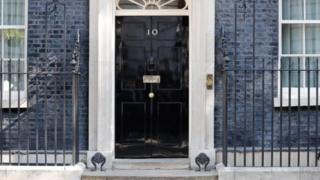 Image copyright
Image copyright
AFP
The winner of the contest will succeed Theresa May as prime minister
The Conservatives have agreed changes designed to speed up the contest to succeed Theresa May as leader.
The party has backed proposals requiring any MP who wants to stand to be backed by eight other colleagues.
It has also set thresholds for how many votes candidates will need from MPs to reach the next round of the contest.
The winner of the contest – in which Tory members will get the final say between two remaining candidates – will be announced in the week of 22 July.
The changes to the first stage of the process were proposed amid criticism about the large number who have thrown their hats into the ring.
Eleven MPs are still in the race, after junior ministers James Cleverly and Kit Malthouse withdrew.
The deadline for contenders to put their names forward is 17.00 BST on 10 June.
Under the previous rules, all the candidates would have needed only two MPs supporting them, but the new rules raise that bar to eight.
After nominations close, all 313 Tory MPs will vote for their preferred candidate in a series of secret ballots that will whittle down the contenders one by one until only two are left.
The first ballot will take place on Thursday 13 June, with further rounds of voting scheduled for 18, 19 and 20 of June.
Under the new rules, candidates will need to win the votes of at least 17 MPs in the first ballot and 33 MPs in the second to proceed.
If all the candidates exceed this threshold, the person with the fewest votes will be eliminated, a process that will continue in subsequent rounds until only two remain.
Party members will get to question the final two candidates in a series of hustings beginning in the week of 22 June.
Then finally the entire Tory membership of 124,000 will choose the winner in a process to be overseen by the Conservative Party board, its national governing body.
‘Highly unlikely’
Sam Gyimah, the only candidate to be proposing another Brexit referendum, said the timing of the changes was “slightly disappointing”, given that people had put themselves forward on the basis of a system that had been in place for many years.
But he told the BBC that he intended to continue with his campaign.
Mr Cleverly and Mr Malthouse, both of whom were considered outsiders, dropped out on Tuesday.
Mr Cleverly said it had “become clear” it was “highly unlikely” he would progress to the final two, while Mr Malthouse said “there was an appetite for the contest to be over as soon as possible” and he was “realistic” about his chances of success.
The size of the field has prompted criticism across the party, with former Conservative leader Iain Duncan Smith likening it to the Charge of the Light Brigade, and former Chancellor Ken Clarke calling the situation a “shambles”.
Housing Secretary James Brokenshire said on Monday that some should consider pulling out because the party needed to find a new leader fast.
Theresa May stands down as leader of the Conservative Party on Friday – she will remain PM until a successor is named.
Who will replace Theresa May?
The winner of the contest to lead the Conservative Party will become the next prime minister.
Tory leadership contest: Rule change agreed to limit candidates}

